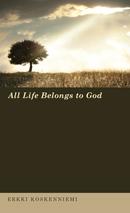Reviewed by Michael A.G. Haykin
This extremely slim book by an adjunct professor of New Testament at the University of Helsinki and at Åbo Akademi University, sheds light on an enormously weighty subject: what does it mean to be human? The whole debate about abortion that has raged in the West for the past forty years or more is about this very issue. And the way forward is by going back: back to some core documents at the heart of western culture: the Scriptures of Judaism and Christianity. Koskenniemi reminds us that Graeco-Roman culture, the context in which the Christian Scriptures of the New Testament were written, was pervaded by as brutal a callousness towards life as any that is regnant in the world today. Common to the Greeks and Romans was child exposure or abandonment, that is, refusal to take care of the child in the first ten days of the child’s life (p.3). The reasons for this varied: fear by a father that the child was not his; the child appeared to be unhealthy; the child was a female (this ancient practice of gendercide parallels what is happening in modern nations in Asia [p.vii–viii]); the omens at the time of birth were not favorable (p. 4–7).
Jewish texts like Psalm 139:13–16, Jeremiah 1:5 or Ezekiel 16:4–7, on the other hand, present a very different picture. There, God indicates his concern for the unborn and he even compares his care of Israel in her early history to the taking care of a child that has been abandoned to death (p.10–11). While, therefore, “the Old Testament does not include a clear ban on exposure,” these texts indicate that Jews practiced a different ethic with regard to the newly born than their pagan neighbors. A number of Jewish pseudepigrapha explicitly describe this ethic, like 1 Enoch 99:5 which condemns as sinners those who “abort their infants” and cast out their newborn. Similarly the Alexandrian Jewish exegete Philo “unambiguously condemns exposure…and regards it as murder” (p.14).
Similarly, while the New Testament does not directly condemn exposure—though Koskenniemi perceives a hint in Ephesians 6:4—a number of very early Christian texts did. The Didache, for instance, specified that actions on the way of death included abortion and exposure (2.2; p.18–19). Building on such convictions, early Christian apologists such as Justin Martyr, replying to pagan accusations that Christians were cannibalistic and ate babies when they celebrated the Lord’s Supper, argued that “to expose newly-born children is the part of wicked men” and a “sin against God” (Apology 27.1; p.21–22). The anonymous Letter to Diognetus, a pearl among early Christian apologetics, similarly said that while Christians have children like their Graeco-Roman neighbors, “they do not expose them once they are born” (5.7; p.23)
With the advent of the imperial church after the Constantinian revolution, much changed for the church, but on this issue of child exposure, there is clear continuity with the pre-Constantinian era (p.29–34). In the perspective of Basil of Caesarea, for example, whose views were extremely influential in subsequent discussion of this subject, intentional child exposure was tantamount to murder (p.30).
Now, why did early Jews and Christians take a position so at odds with Graeco-Roman culture? As with reasons for child exposure, the reasons for the Jewish and Christian position are various: the conviction that human beings are truly human while still in the womb (p.35–36); a high view of family where to be childless was regarded as shameful (p.36–38); the firm belief that sexuality existed first and foremost so as to produce children (p.38–39); child exposure is unnatural and against divine law (p.43–44, 48–52). Did Jews and Christians expose their infants despite admonitions like those above? The evidence is slight, but as Koskenniemi argues, if there were regular warnings against this sin, then we can expect a few Jews and Christian did do it.
This is an important work, for, as the Finnish author shows, there is a clear parallel between contemporary arguments to safeguard the unborn with Jewish and Christian arguments against child exposure. As Koskenniemi powerfully concludes: “A human being, including one newborn, even unborn, is a masterpiece of God, and no one has the right to destroy it” (p.60).
Dr. Michael Haykin
Professor of Church History and Biblical Spirituality, Southern Baptist Theological Seminary
Director, Andrew Fuller Center for Baptist Studies
Buy the books

All Life Belongs To God